Colorectal or colon cancer is one of the leading causes of death by cancer but is not discussed enough so people practice caution. At a recent seminar held at the Consulate General of India in New York earlier this week, noted doctors and experts spoke at length about the importance of creating awareness, early screening and timely treatment of colon cancer.
March is celebrated as Colorectal Cancer awareness month. Colorectal cancer is cancer that starts in the large intestine (colon) or the rectum (end of the colon). Other types of cancer affecting the colon include lymphoma, carcinoid tumors, melanoma, and sarcomas. A recent study published by the American Cancer Society said that one in five colon cancer cases diagnosed today occurs in people younger than age 55, defying the notion that it only affects older people. Much like this, a lot is not known about colon cancer, which the doctors at the Consulate General of India tried to highlight and explain.
Seminar on Colon Cancer in NY
On the occasion of Colorectal Cancer Awareness month, a deep dive seminar into colon cancer educated people about colon cancer, its causes, symptoms and the urgent need for early detection and timely treatment.
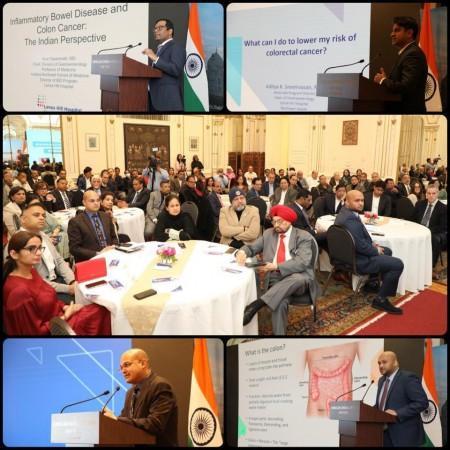
Consul General of India in New York, Randhir Jaiswal; Dr. Ashwin Vasan, New York City Health Commissioner; Dr. Varun Jeph, Deputy Consul General of India, New York; Dr Arun Swaminath, who serves as the director of the Inflammatory Bowel Diseases Programme at Lenox Hill Hospital; Dr Aditya Sreenivasan, Associate Programme Director, Department of Gastroenterology, Lenox Hill Hospital, Northwell Health; and Dr Peter Bhandari, New York Chapter of the American College of Physicians (NYACP) Council Board Resident Representative for the Manhattan/Bronx Region, were present at the seminar to share insights on colon cancer.
Jaiswal welcomed NYC Health Commissioner and the three subject experts and members of the community to the discussion which is so important for the South Asian community and the entire global community. He remarked that the event was special as young doctors from the community had taken the lead to create awareness about this important issue. Speaking on the occasion, Dr Jaiswal also highlighted that 2023 is the year of millets. He also encouraged the doctors' community to promote millets in everyone's diets for a healthy lifestyle.
"I would like to thank Mr. Prem Bhandari for contributing in so many ways to the promotion of millets, which are a gluten-free superfood in the world. It is also helpful for tackling several health challenges that we face - such as obesity, diabetes, and so on and so forth. I was also told that millets are grown in this country in Texas. So therefore, it is something that we all have buy-in and we would really look forward to the support and encouragement from the doctoral community, the medical fraternity, to promote millets in this country," Dr Jaiswal said.
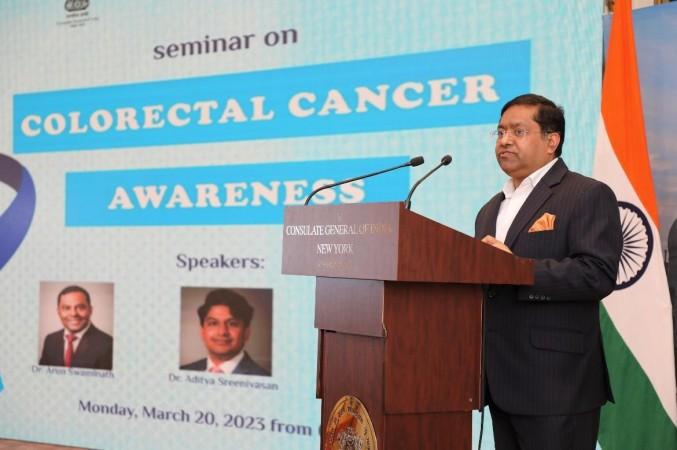
The three-member panel comprising of Dr Arun Swaminath, Dr Aditya Sreenivasan and Dr Peter Bhandari reflected on the current situation of colon cancer in the US and among the South Asian community, the disease's widespread, lack of awareness and timely treatment.
"The fact that we are getting together in this manner and the fact that we have a panel discussion led by three young doctors, speaks volumes about what the Indian American doctors are doing in this country and the kind of strength they command in this society. thank you very much for your contribution because in that we also see a reflection, a very strong reflection of India-US strength," Jaiswal said at the seminar.
The New York health commissioner, Dr. Ashwin Vasan, shared how the low screening rates for colon cancer among the South Asian community, an issue close to home. He further noted that as the world emerges from the COVID-19 pandemic, "we have a unique opportunity to turn the tide on these low rates of colorectal cancer screening, to reengage in our overall health and well-being, to focus... on prevention, moving upstream and focusing on the impact of diet and activity and exercise."
"This is an epidemic that's been underneath the surface for a long time," the Indian-origin physician and epidemiologist said at a seminar on Colorectal Cancer Awareness organized at the Consulate General of India.
Citing some shocking data on low screening rates for colon cancer in certain communities, Vasan said, "the proof is in the epidemiological pudding," adding that according to the city's data, Asian and Pacific Islanders have the lowest rates of colorectal cancer screening (48.1 percent) compared to the Blacks, Whites and Latino counterparts (70.8 percent).
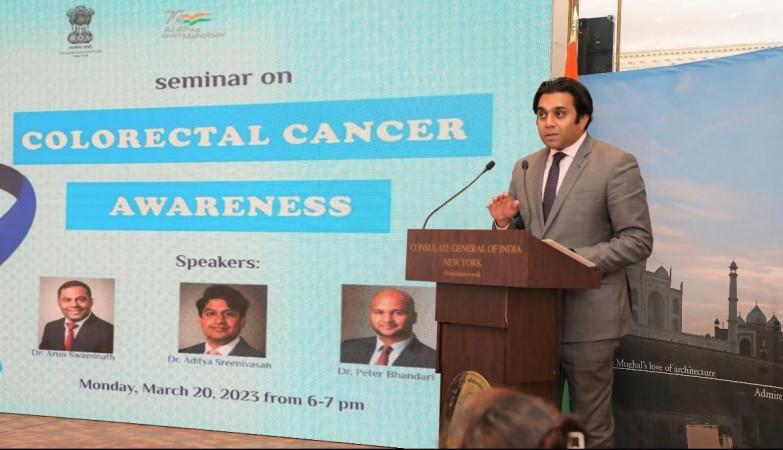
"I see every day the downstream impacts of lack of access to basic preventive tools and to screening in almost every patient I treat and for colon cancer. I see resistance to colonoscopies. I see resistance to dietary counselling. I see resistance to engagement for communities that have often been left behind," he said.
Speaking about the initiatives taken to counter the setback caused due to the pandemic, Dr Vasan said that his team has adopted multilingual approach.
"All crucial preventive measures for the development of cancer of many types, but especially colorectal cancer. at the health department we, for years have been engaged in education campaigns in engagement with clinicians and health systems to ensure that we can increase year-over-year rates of screening. And unfortunately, the pandemic has kicked that work backward. All of our educational materials after the health department are translated into 13 languages, including Hindi, Urdu and Bengali, and we will continue this commitment to everyone in New York City," he said.
Dr Arun Swaminath explained the various symptoms related to colorectal disease, including diarrhea and weight loss. He noted that 5 percent of the US population will develop colon cancer in their lifetime and "most of them will have no symptoms," stressing the importance of getting regular tests, and colonoscopy screenings to ensure early detection and treatment.
Dr Aditya Sreenivasan outlined colorectal risk factors as well as dietary and lifestyle habits, including regular exercise, that can help in the long term.
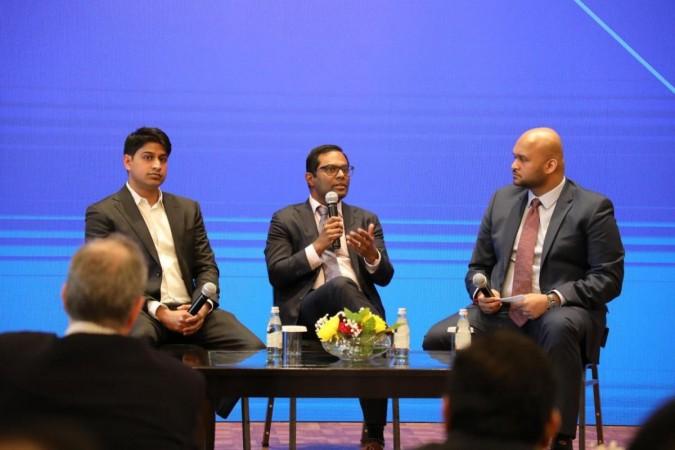
"Many people understand the clear link between smoking and lung cancer, lung disease or heart disease, but it is clearly associated with the increased risk of colon cancer as well," he said.
He noted that being sedentary for more than 14 hours a day was associated with more than 2.5 times the risk of developing colon cancer. "So it's more important than ever to get up, walk around and get some form of exercise every day," he explained.
It is recommended that adults between the ages of 45 and 75 have a colonoscopy at least once every 5-10 years, depending on family medical history, digestive health issues and other gastrointestinal symptoms, according to Northwell Health.
Taking the seminar further, Dr Peter Bhandari gave a detailed presentation about colon cancer, starting by explaining what a colon is.
Colon is a large organ in the digestive system about four to six feet long. Its primary function is to reabsorb water and minerals and to create waste that is known as stool. It has four major parts, the ascending, the transverse, the descending, and the sigmoid colon. These parts, in addition to the rectum, are what is known as the large intestines and colorectal cancer can occur in any one of these.
Dr Bhandari noted that colorectal cancer is the third most diagnosed cancer worldwide with approximately 1.9 million new cases in the year 2020. It is the second deadliest cancer with approximately 900,000 deaths, and it also is responsible for approximately 10% of global deaths related to cancer. As alarming as these numbers are, he added that it is one of the most preventable cancers when identified early.
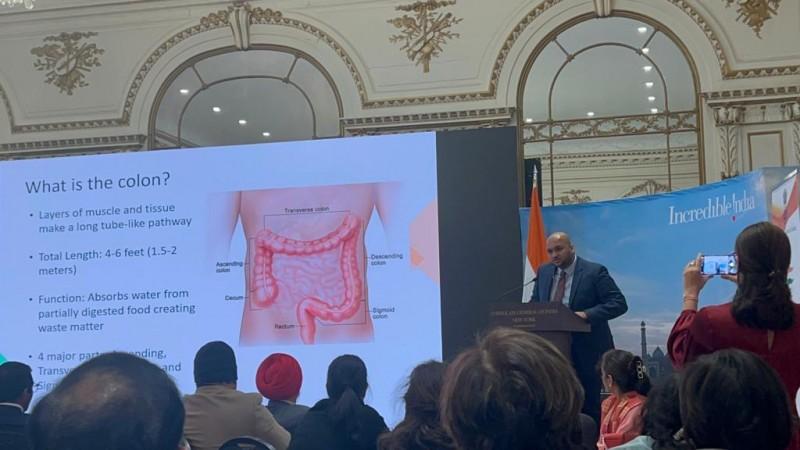
Not all polyps are cancerous, Dr Bhandari explained. Some can be pre-cancerous or benign, and it might take years before they become cancerous. It's hard to tell from the initial colonoscopy, which is why these polyps are removed and sent for further analysis.
When the colorectal polyps progress from benign polyps to more cancerous polyps, they initially start off with stage zero, which is localized to just where the polyp is. And as it progresses to stages three and four, which is a more advanced condition, you'll see that it can spread to lymph nodes and to other parts of the body, or metastasize.
Dr Bhandari also briefed about colon cancer symptoms or lack thereof. Patients can present with multiple symptoms or no symptoms at all. There may be abdominal or belly cramps or pain, blood in or on the stools, change in stool caliber or consistency, unexplained fatigue and weight loss. But what's important to realize is that a good portion of patients doesn't present with symptoms, making the screening colonoscopy extremely important.
The Global Cancer Observatory have shared some results in 2008, which showed at that time the incidence of colorectal cancer in men was 4.3 per hundred and in women, 3.5 per hundred thousand.
But looking ahead to the next two decades, colorectal cancer is projected to continue to increase at a very steep percentage. The increase in India is projected to be approximately 65% and that is on par with countries such as China and Brazil.
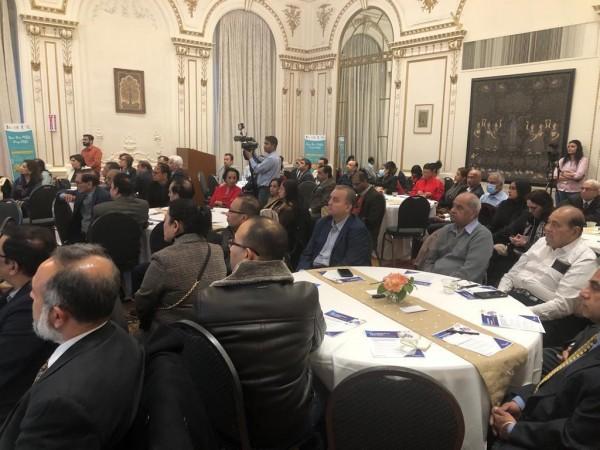
Diving a bit deeper into why the incident rates are going up and in which particular age group, he noted that a younger population is being diagnosed with colorectal cancer more often and much more frequently than the older populations. The incidence rates are much higher in the zero to 49 years old. This age group also has a higher mortality rate, which tells me that not only is colorectal cancer being diagnosed more frequently in a younger population, it's presenting at a more advanced stage.
A study from the Rajiv Gandhi Cancer Institute and Research Center looked at about 2200 patients from 2012 to 2016 and found a 60% increase in colorectal cancer with a predominance in a younger patient population.
These studies have enabled the identification of potential barriers as to why the South Asian community has not been able to obtain colorectal screening:
- Lack of awareness of colorectal cancer and screening guidelines and the therapeutic options that we have.
- Accessibility both from a geographic standpoint as well as an economic standpoint.
- Social and cultural beliefs. There is a stigma behind getting a colonoscopy or even colorectal cancer, which may not be there with other routine screenings for other diseases.
- Communication language barriers. India is one of the few countries that is so diverse and rich within its own country with various languages and dialects, which can definitely pose an issue in terms of communicating.
"Hopefully we'll guide institutions and individuals to better target awareness campaigns so that we may be able to provide medical care at an even level for all ethnicities," Dr Bhandari concluded.
Deputy Consul General Dr. Varun Jeph delivered the closing remarks thanking the three subject experts for the informative and enriching discussion and exposition. He shared that the idea behind organizing this session was to create awareness about screening for colon cancer for early detection and consequently timely treatment and better prognosis and also to promote healthy lifestyle and life choices that reduce the chances of developing such cancers. He joined the doctors in encouraging the community to avail of screening modalities and adopt a healthy lifestyle, particularly dietary habits.
"The idea behind organising this session was to create awareness about colorectal cancer, how to catch the disease early and start timely treatment. The idea was also to promote a healthy lifestyle, so we are able to prevent diseases like colorectal cancer. Our sincere gratitude to NY health commissioner, who have insights about what the city administration is doing to promote our health and personal hygiene. The stars of the evening were the three doctors — Dr Sreenivasan, Dr Swaminath and Dr Bhandari — who gave detailed presentations about colon cancer in such a way that everyone could understand," Jeph concluded.














